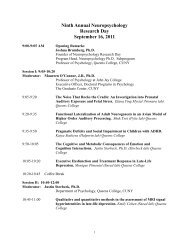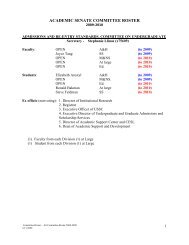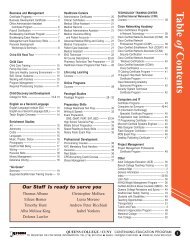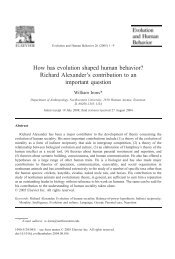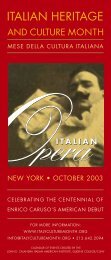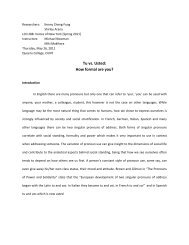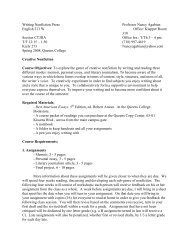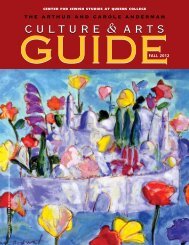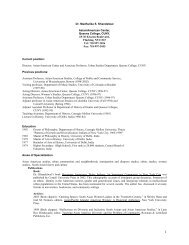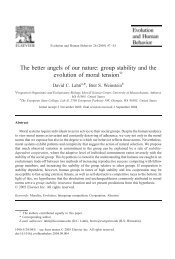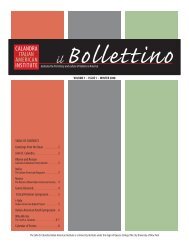Intransitive and transitive verbs
Intransitive and transitive verbs
Intransitive and transitive verbs
- No tags were found...
You also want an ePaper? Increase the reach of your titles
YUMPU automatically turns print PDFs into web optimized ePapers that Google loves.
Chapter 5<br />
Queens College Japanese 204, Spring 2008 1 <br />
<br />
1<br />
(<strong>In<strong>transitive</strong></strong> <strong>and</strong> <strong>transitive</strong> <strong>verbs</strong>)<br />
<strong>In<strong>transitive</strong></strong> <strong>verbs</strong><br />
Transitive <strong>verbs</strong><br />
(people get together)<br />
(to gather people together)<br />
(an illness heals)<br />
(to cure an illness)<br />
(a clock gets fixed)<br />
(to fix a clock)<br />
<br />
(a mistake gets corrected)<br />
<br />
(to correct a mistake)<br />
<br />
(employment is decided)<br />
<br />
(to decide on employment)<br />
<br />
(a job continues)<br />
(the water boils)<br />
<br />
(to continue a job)<br />
(to bring the water to a boil)<br />
(the food remains)<br />
(to leave some food)<br />
<br />
(a kanji is wrong)<br />
<br />
(to make a mistake in kanji)<br />
(a window opens)<br />
(to open a window)<br />
(a door closes)<br />
(a wallet drops)<br />
(to close a door)<br />
(to drop a wallet)<br />
(a light turns on)<br />
(to turn on a light)<br />
(a light goes off)<br />
(to turn off a light)
Chapter 5<br />
Queens College Japanese 204, Spring 2008 2 <br />
<strong>In<strong>transitive</strong></strong> <strong>verbs</strong><br />
Transitive <strong>verbs</strong><br />
(the phone rings)<br />
(to make a phone call)<br />
<br />
(a job changes)<br />
(to change a job)<br />
(grades go up)<br />
(to raise one’s grades)<br />
(a class ends)<br />
(to finish a class)<br />
(a movie begins)<br />
(to begin a movie)<br />
(a child wakes up)<br />
(to wake up a child)<br />
(the child gets in the car)<br />
(to put a child in a car)<br />
(from p.237)<br />
Fill in the blanks using appropriate forms of the expressions from the above chart. Also translate<br />
the whole sentences.<br />
1. <br />
2. <br />
3. <br />
4. <br />
5.
Chapter 5<br />
Queens College Japanese 204, Spring 2008 3 <br />
6. <br />
7. <br />
8. <br />
9. <br />
<br />
10. <br />
<br />
<br />
11. <br />
12. <br />
13. <br />
<br />
14. <br />
<br />
15. (road, way)<br />
2
Chapter 5<br />
Queens College Japanese 204, Spring 2008 4 <br />
<br />
<br />
<br />
(future) (to think) (to quit) <br />
(salary)<br />
<br />
(to study abroad) (to get a job)<br />
Q1: <br />
Q2: <br />
Q3: <br />
Q4: <br />
Q5: <br />
Q6: <br />
I. Using <strong>and</strong> <br />
A. Using <br />
A-1.+ affirmative (already; yet(in question))<br />
<br />
(I already put the kids into the car.)<br />
<br />
(The job has already been decided. / I’ve already got a job)<br />
(Have you prepared for tomorrow yet)<br />
Yeah, I already have.<br />
A-2. + negative (not ~anymore; not ~ any longer)<br />
<br />
(I don’t go (there) anymore.)<br />
<br />
(This car cannot be fixed any longer. / This car is beyond repair.)<br />
<br />
(This job is tough, so I no longer want to do it.)<br />
B. Using
Chapter 5<br />
Queens College Japanese 204, Spring 2008 5 <br />
B-1. +affirmative (still)<br />
<br />
(Mr.Tanaka is still continuing that job./Mr.Tanaka is still doing that job.)<br />
<br />
(The child is still sleeping.)<br />
<br />
(There is still some food left.)<br />
B-2. + negative (not ~ yet)<br />
<br />
(I have not collected the money yet.)<br />
<br />
(Mr. Yamada has not come here yet.)<br />
*When is followed by an action verb + , it expresses “have not done ~yet”. If<br />
is used with the simple negative form of an action verb, it means “won’t do ~ for a while”.<br />
e.g. I haven’t seen it yet.<br />
I won’t see it for a while.<br />
* can be used to mean “not yet”.<br />
<br />
Have you seen the movie yet No, not yet.<br />
2<br />
Practice short exchanges shown in (1)-(4) using the vocabularies below. Use casual language.<br />
(1)<br />
“Have you submitted your hw yet” “Yeah, I already have.”<br />
(2) <br />
“Have you submitted your hw yet” “No, not yet.”<br />
(3)<br />
“Haven’t you submitted your hw yet”<br />
“No, not yet.”
Chapter 5<br />
Queens College Japanese 204, Spring 2008 6 <br />
(4)<br />
“Haven’t you submitted your hw yet”<br />
“Yeah, I already have.”<br />
<br />
<br />
3<br />
Translate the following English sentences into Japanese. Use polite language.<br />
1. The illness has already healed.<br />
2. The illness has not healed yet.<br />
3. Has the illness healed yet<br />
4. Hasn’t the illness healed yet<br />
5. This illness will not heal any longer.<br />
6. I have already turned off the light.<br />
7. I haven’t turned off the light yet.<br />
8. Have you turned off the light yet<br />
9. Haven’t you turned off the light yet<br />
10. I won’t turn off the light yet.<br />
11. Is Tanaka still sleeping<br />
12. Are you still continuing your job<br />
13. Are you still boiling water
Chapter 5<br />
Queens College Japanese 204, Spring 2008 7 <br />
14. Are you still fixing the clock<br />
15. I won’t make a mistake in kanji anymore.<br />
16. I’m not going to get married for a while.<br />
17. I’m not married yet.<br />
18. Tanaka is not here yet. (He hasn’t come here yet.)<br />
19. I don’t want to study anymore.<br />
20. You’d better wake up the kid already.<br />
II-A. Expressing purpose <strong>and</strong> reason, using the plain form +<br />
A-1. Expressing purpose, using the verb plain form or the noun plain form +<br />
(in order to ~; for the sake of ~; for ~)<br />
<br />
I am studying at this college in order to become a doctor.<br />
<br />
I am studying in order to raise my grades.<br />
<br />
<br />
I want to have a job that will be good for me.<br />
<br />
If you don’t like that work, then why are you taking a job at that company<br />
<br />
You should experience various things while you are young, for the sake of your future.<br />
* can be followed by when it modifies a noun, because itself is a noun.
Chapter 5<br />
Queens College Japanese 204, Spring 2008 8 <br />
This is the money to buy a new car.<br />
4<br />
Translate the following English sentences into Japanese.<br />
1. I’m studying Japanese to make Japanese friends.<br />
2. I’ve been saving money to buy a new car.<br />
3. We’ll hold a party tomorrow for our father.<br />
4. I’ll quit smoking for my health.<br />
5. This is a computer room for the students of Japanese language.<br />
6. I turned off the light to watch a movie.<br />
7. I turned on the light to read a book.<br />
8. I bought a dress for the wedding ceremony.<br />
9. What are you studying Japanese for<br />
10. My boyfriend will do anything for me.<br />
11. I want to have a part time job that will be good for me.<br />
A-2. Expressing reason or cause, using the plain form +(because ~ ; since ~)
Chapter 5<br />
Queens College Japanese 204, Spring 2008 9 <br />
*When the plain form + expresses a reason or cause, it can be replaced by or . But<br />
is more formal than or , so it is rarely used in casual speech.<br />
<br />
<br />
Since I was busy with preparations for the wedding, I could not call you.<br />
<br />
<br />
Since I quit my job, life got tough.<br />
<br />
That child is still hospitalized because the injury has not healed.<br />
<br />
I can’t go to my part-time job today because I have an exam.<br />
Category Dictionary form Example Meaning<br />
-adjectives <br />
<br />
<br />
<br />
Copula <strong>verbs</strong> <br />
<br />
<br />
<br />
-adjectives<br />
<br />
<br />
<br />
<br />
<br />
<br />
Verbs <br />
<br />
<br />
<br />
because it is good<br />
because it isn’t good<br />
because it was good<br />
because it wasn’t good<br />
for the sake (because) of the student<br />
because he isn’t a student<br />
because he was a student<br />
because he wasn’t a student<br />
because he is healthy<br />
because he isn’t healthy<br />
because he was healthy<br />
because he wasn’t healthy<br />
in order to do; because he does<br />
because he doesn’t do something<br />
because he did something<br />
because he didn’t do something
Chapter 5<br />
Queens College Japanese 204, Spring 2008 10<br />
<br />
*The -stem of the verb + is also used to express purpose, but this usage is limited to cases<br />
when the main verb is a motion verb, such as . The word can be used<br />
with any verb. When is used with a motion verb, it is usually accompanied by a directional<br />
phrase, <strong>and</strong> expresses a rather important purpose. On the other h<strong>and</strong>, the -stem of<br />
<strong>verbs</strong> + can be used without a directional phrase, <strong>and</strong> the purpose does not have to be<br />
important.<br />
<br />
<br />
(This is probably too much - sounds like you are in charge!)<br />
<br />
5<br />
Translate the following English sentences into Japanese.<br />
1. Since the weather was bad, the concert at Central Park was cancelled.<br />
2. Since I caught a cold, I couldn’t attend the class.<br />
3. Since I don’t have a license, I cannot drive.<br />
4. Since I was still a high school student that time, I couldn’t go to a bar.<br />
5. Since it is dangerous, please don’t enter here.<br />
6. Because of the illness, I cannot go travel.<br />
7. Because of rain, the baseball game will be cancelled.<br />
8. Since I slept with the window open, I caught a cold.<br />
9. Since my father’s job changed, we moved ().<br />
II-B. Expressing the making of preparations, using -form + (do ~ in advance)
Chapter 5<br />
Queens College Japanese 204, Spring 2008 11<br />
<br />
<br />
<br />
I will check out various things about graduate school before I graduate.<br />
<br />
Please leave the door open because a student is coming.<br />
<br />
Your father is coming back soon, so get the bath ready.<br />
*The verb -form + is used when someone has done or is doing something for a future<br />
purpose, or is leaving the current state as it is because of some future consideration.<br />
*The form becomes in casual speech.<br />
e.g.<br />
to leave some food for someone<br />
to consult with the teacher in advance<br />
<br />
to ask the president (a favor) in advance<br />
6<br />
Translate the following English sentences into Japanese.<br />
1. You’d better consult with the teacher before deciding on college.<br />
2. I left some cake for Tanaka.<br />
3. Since I heard that it would rain tonight, please close the window before going to bed.<br />
4. Since I’ve never been to Tanaka’s house, I will check a map before going.<br />
5. I fixed tea for you.<br />
6. You’d better get your driver’s license before graduating from high school.
Chapter 5<br />
Queens College Japanese 204, Spring 2008 12<br />
<br />
7. I will be all right because I made a reservation at the restaurant.<br />
8. Please think about the answer to this question/problem by tomorrow.<br />
9. Since Tanaka is coming, please make a cake.<br />
III-B. Expressing the results of intentional action, using -form +<br />
(something has been done)<br />
<br />
The dinner has been made for you, so please eat it later.<br />
<br />
Since it is hot, the window has been left open.<br />
<br />
<br />
The hotel reservation has been made, <strong>and</strong> a plane ticket has been purchased.<br />
<br />
<br />
As for this issue (about this issue), it has been spoken to the president.<br />
* The verb -form + expresses a state that has resulted from an intentional action. It is<br />
usually used to express a situation where someone has done something for some purpose <strong>and</strong> the<br />
speaker wants to talk about the state resulting from that action.<br />
*When the main verb is <strong>transitive</strong>, the direct object can be marked with either or . The <br />
tends to be used if the speaker performed the action.<br />
* Think how the following three sentences are different:<br />
1. <br />
2. <br />
3. <br />
7
Chapter 5<br />
Queens College Japanese 204, Spring 2008 13<br />
<br />
Translate the following English sentences into Japanese.<br />
1. As for the issue about college, it has been consulted with the teacher.<br />
2. Cake has been left for Tanaka.<br />
3. Since I heard that it would rain tonight, the window has been closed.<br />
4. As for Tanaka’s house, it has been found on a map.<br />
5. Tea has been fixed for you.<br />
6. A driver’s license has been obtained.<br />
7. A restaurant reservation has been made.<br />
8. The answer to this question/problem has been thought about.<br />
9. The place of the party has been decided.<br />
IV. Using plain form + the particle <br />
* Note the two exceptions: <br />
A. plain form + (either X or Y)<br />
<br />
<br />
I intend to look for a job either in Japan or in the United States.<br />
<br />
<br />
I want to become a lawyer or an accountant in the future.
Chapter 5<br />
Queens College Japanese 204, Spring 2008 14<br />
<br />
<br />
<br />
I’m thinking of wearing these clothes for either a wedding or graduation.<br />
<br />
<br />
This weather will probably continue until tomorrow or the day after tomorrow.<br />
8<br />
Translate the following English sentences into Japanese.<br />
1. I want to eat either sushi or udon.<br />
2. Please read it by either Monday or Tuesday.<br />
3. May I come either at 5 or 6 o’clock<br />
4. You have to have either your driver’s license or student ID.<br />
5. Tanaka is not here today. He is probably either busy or ill.<br />
6. As for the party, it will be (held) either at a restaurant or a bar.<br />
7. Please bring either a blue pen or a black pen.<br />
8. I think I will make either pasta or steak.<br />
9. Could you teach me either how to make a cake or how to make a pie
Chapter 5<br />
Queens College Japanese 204, Spring 2008 15<br />
<br />
B-1. Embedded yes/no questions, using plain form+(whether or not ~; if~)<br />
<br />
I will ask if this illness will be cured.<br />
<br />
Please see/check if the wallet was dropped.<br />
9<br />
Translate the following English sentences into Japanese.<br />
1. Please ask whether or not I took a wrong way.<br />
2. I want to know whether or not I will be able to get an A.<br />
3. Please see/check whether or not the light is on.<br />
4. Please see/check whether or not the door is closed.<br />
5. Please see/check whether or not the door has been closed.<br />
6. I don’t know whether or not I like Tanaka.<br />
7. I don’t know whether or not I should go on a date with Tanaka.<br />
8. Please ask Yamada whether or not he wants to marry Suzuki.<br />
9. I want to know whether or not there will be a quiz tomorrow.<br />
10. Please tell me whether or not you are busy tomorrow.<br />
11. Please tell me whether or not the movie was good.<br />
12. Please tell me whether or not your illness healed.
Chapter 5<br />
Queens College Japanese 204, Spring 2008 16<br />
<br />
B-2. Embedded information questions, using plain form+<br />
(when, what, where, etc.)<br />
<br />
<br />
I don’t know what kind of research Yamada is doing.<br />
<br />
<br />
I forgot whom I invited to the party.<br />
<br />
<br />
Please tell me where the meeting hall is.<br />
10<br />
Translate the following English sentences into Japanese.<br />
1. Do you know when Tanaka is coming<br />
2. I want to know what kind of food Tanaka doesn’t like<br />
3. Please tell me where the party is going to be held.<br />
4. Please ask Tanaka who he invited to the party.<br />
5. I know who got an A+.<br />
6. I want to know where Tanaka went.<br />
7. I have to think when I want to get married.<br />
8. I forgot what the homework was.<br />
9. I forgot by when I had to submit the homework.
Chapter 5<br />
Queens College Japanese 204, Spring 2008 17<br />
<br />
V. Using question word + <br />
A. Question word + + negative verb (not ~ any ~ ; no~)<br />
<br />
There is nothing in the box.<br />
There is nobody in front of me.<br />
Nobody came yesterday.<br />
I didn’t go anywhere yesterday.<br />
I haven’t eaten anything yet.<br />
<br />
I’m so busy <strong>and</strong> I can’t do any of the things I want to do.<br />
* the question word + can be used only in sentences ending in a negative form. The addition<br />
of to the question word causes the meaning of the phrase to become “not ~ any”.<br />
B. Question word + + affirmative verb (any; whatever/whenever/wherever, etc.)<br />
<br />
Kimura can eat anything.<br />
<br />
Today is not good, but tomorrow will be fine anytime.<br />
<br />
As for me, any restaurant will be fine as long as it serves good food.<br />
<br />
“Who shall we invite”<br />
“Anybody you want to.”<br />
<br />
“Which one would you like, coffee or tea”<br />
“Whichever is fine with me.”
Chapter 5<br />
Queens College Japanese 204, Spring 2008 18<br />
<br />
Q-word + + +<br />
Affirmative sentence Negative sentence Affirmative sentence<br />
<br />
<br />
(something) (nothing; not at all) (anything; whatever)<br />
(someone) (nobody) (anybody; whoever)<br />
(sometime) *(never) (anytime, whenever)<br />
(somewhere) *(nowhere) *(anywhere, wherever)<br />
*(not~either) (whichever)<br />
*The phrase <strong>and</strong> can be used either in an affirmative or a negative sentence.<br />
Tanaka always eats breakfast.<br />
Tanaka never eats breakfast.<br />
I like both of them.<br />
I don’t like either of them.<br />
*The particles <strong>and</strong> are not used with the question word + or (e.g. <br />
) . However, other particles, such as <strong>and</strong> are inserted between the<br />
question word <strong>and</strong> or .<br />
<br />
<br />
<br />
<br />
<br />
11<br />
Translate the following English sentences into Japanese.<br />
1. You don’t know anything about Japan, do you<br />
2. If (it’s) Japanese food, I like anything.<br />
3. Don’t tell this to anyone!
Chapter 5<br />
Queens College Japanese 204, Spring 2008 19<br />
<br />
4. Whoever is fine (I don’t care who), please help me with cleaning.<br />
5. That kid is always crying.<br />
6. That student never comes with his homework.<br />
7. You can return the book anytime.<br />
8. You can stay here until whenever.<br />
9. Nowhere is safe.<br />
10. As for overseas, I’ve never been to anywhere.<br />
11. I can sleep anywhere.<br />
12. Both are difficult.<br />
13. Neither of them is fun.



